Smoking Out the Misinformed Criminalisation of Cannabis in Kenya
There are few things that animate the old saying “where there is smoke, there is fire” better than the hyper-hysterical reaction to the smoke emanating from the thermodynamic effects of cannabis. Historically, this smoke has inspired the mobilisation of some of the biggest ‘fire fighting missions’ known to humans.
Quests to put out this fire that produces the cannabis smoke have led kingdoms, papacies, chiefdoms, states, and governments to wage wars against this enemy. Laws, military expeditions, religious edicts, and social propaganda have been hurled against this plant – cannabis; its growing, harvesting, possession, trading, and consumption. Globally, hundreds of billions of dollars have been spent in the attempt to ensure that no one lights up! Lives, limbs and properties have been lost in attempts to vanquish this vegetation.
However, despite this global melodrama, the plant remains firmly rooted, its production and consumption neither dropping nor stopping. Paradoxically, the growing and consumption of cannabis has increased especially in the recent times. This may be attributed to the emergent phenomenon of a traumatised global society cathartically seeking escape, psychedelic or otherwise, or the adventure-inspired adrenaline rush triggered by the use of a contraband (forbidden fruits taste sweetest) or the need for the ‘dope’ from the cannabinoids, the active psychotropic compound that causes the feel good ‘highness’ sensation associated with cannabis, thereby earning the plant even more consumers.
Beyond psychosocial uses, cannabis is widely used medically and culturally. That is why the laws, wars, and propaganda unleashed against it have not borne fruit. Counterintuitively, these have instead firmly enhanced the social, cultural, and economic position of the plant. To cheekily paraphrase former American first lady, Michelle Obama, the planters, hunters, and punters of cannabis seem to have declared that “When they go law, we go high”!
Like it or not, Marijuana is here to stay
It is under these circumstances that the world is slowly but surely sliding into admission that efforts to extinguish the cannabis fire are futile. The current highly infectious wave of the relaxation of laws regulating cannabis production, proprietorship, and consumption of cannabis, also known as marijuana (bhang, bangi, reefer, boza, blunt, grass, weed, ganja, sigara maduong’, charas, daga, holy herb, Mary Jane) is as a matter of fact unstoppable.
There’s no cure nor vaccine for it!
Through policy and legislation, governments are finally heeding the words of Peter Tosh, the late Jamaican Reggae legend, who in advocating for the rehabilitation of the plant’s stature famously sang – “Legalize it…Don’t criticise it…and I will advertise it” as states are busy decriminalising, or in various fashions, relaxing their stances regarding marijuana.
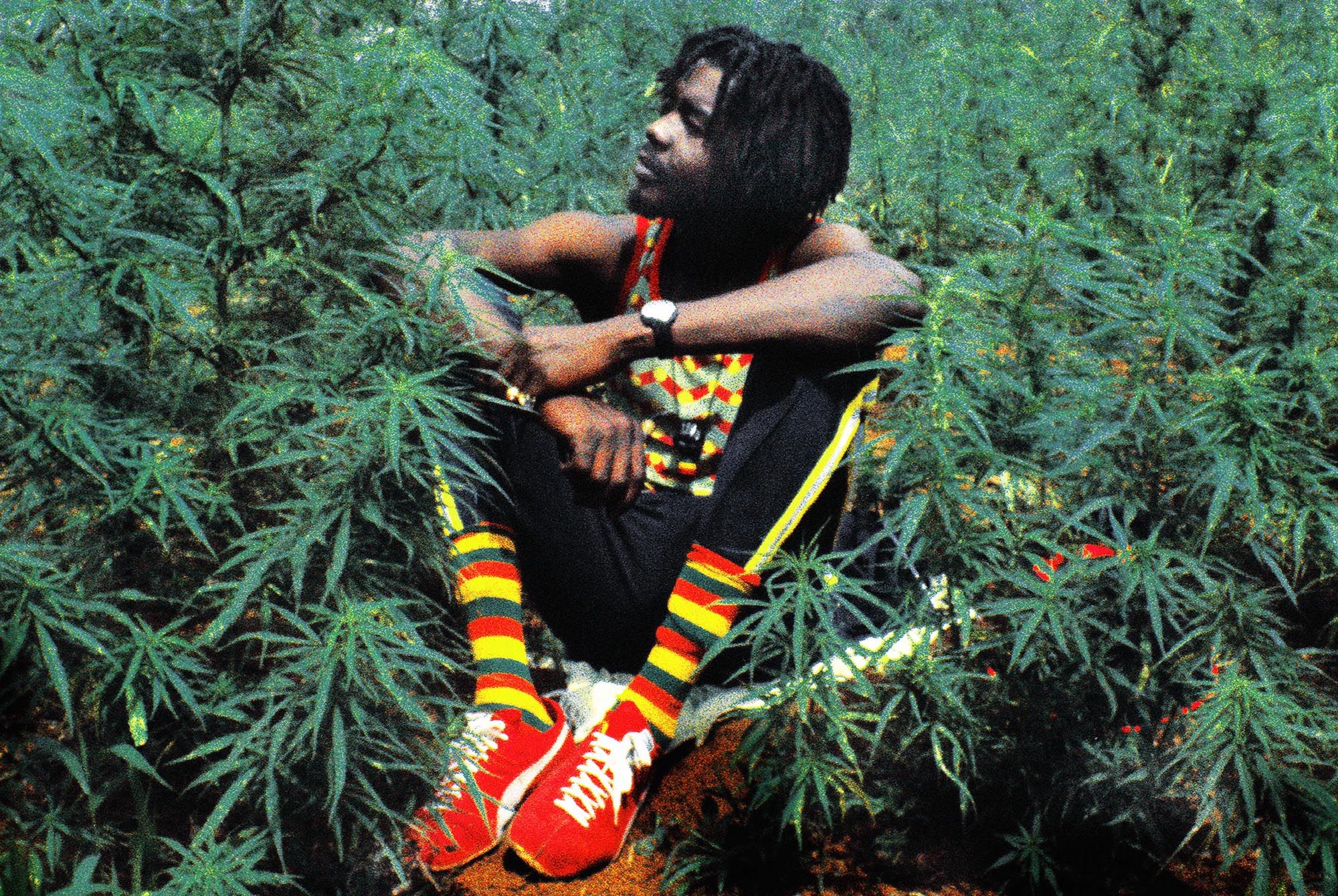
This change in direction in which the ganja smoke is blowing – from facing all out opposition to now finding palpable acceptance – can be attributed to either the sobering realisation that the war against marijuana is Sisyphean – an unwinnable war – or as a result of the successes of the pro-marijuana lobby’s counter-propaganda, aside from revelations about the plant’s health and medical benefits, it’s industrial and economic benefits, or the Libertarian argument advocating for the respect of personal choice. American economics professor Art Carden summed up the futility to combat marijuana in a Forbes article aptly titled, It’s Time To Admit: Drugs Won The War on Drugs!
We Always Had The Weed
Drugs, and for that matter marijuana, eventually won because like the American invasion of Iraq, the war against ganja was wrongly premised, intentionally manufactured and fake. But be that as it may, throughout history, cannabis has had a love-hate relationship with society.
And yet going deep into ancient societies across the globe, the planting and using of cannabis is as old as the recorded history of the modern human.
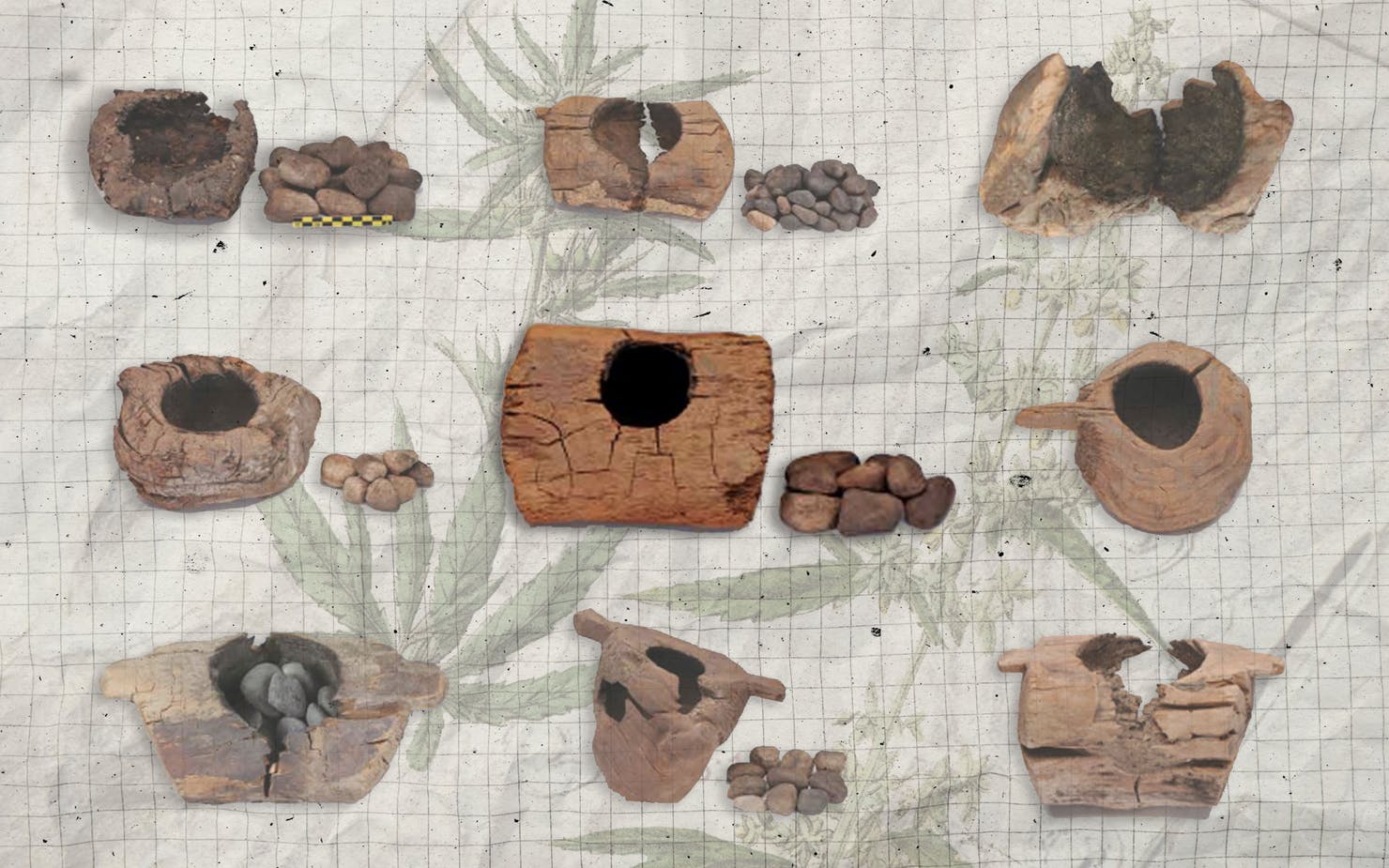
In The Coevolution of Humans and Cannabis, Ocean Malandra argues that this plant’s origins and history are as mysterious as its stalking, shadow-like enduring relationship with humans, stating that “Cannabis has no fossil record, so nobody really knows how long it has been around on the planet but the first human use appears about the same time agriculture was invented, making cannabis one of the oldest cultivated plants on earth.” The same article adds that the plant “co-evolved” with humans, asserting that it is for this reason that the cannabis has emerged to have numerous uses for humans.
Marijuana’s Equally Utilitarian Cousin
Just like its cousin hemp, whose criminalisation was occasioned more by commercial interests and not the popularly advanced health and/or moral antecedents, marijuana’s face and fate have primarily been subjectively engineered.
In the co-evolution article excerpted above, hemp has been described as a “super durable fibre… responsible for much of the technology that humans have relied upon to reach our current state as the dominant species of the world.”
Despite this demonstrated value, hemp was criminalised in the USA in 1937, “so that the unsustainable fossil fuel industry could take over.” Its relegation also paved way for the lumber industry, with hemp fibre taking credit for facilitating inter-continental human contact and trade, with its use going as back as the times of the Phoenicians (1500-300 B.C.), when it was used to make ship sails. Hemp was also used to make paper (first Gutenberg Press Bible and America’s declaration of Independence), and industrial rope. Due to selfish business interests, hemp was given a bad name and dumped in the sin bin.
So was Marijuana, which like the proverbial dog, also given a bad name and then noosed?
The Propaganda Woes and Wars
In A Brief Global History of the War on Cannabis, Ryan Stoa observed that “Prohibitionists around the world have long used rhetoric to associate the plant with violence and depravity.” The ostracising and criminalising of ganja has greatly been enabled through deliberate propaganda, and misinformation.
Paraphrasing Noam Chomsky, public opinion about marijuana has been achieved through a systematic ‘manufacture of dissent.’ Since time immemorial, stories and narratives that negatively portray marijuana have been used to uproot the cannabis plant out of society’s favourable grounding.
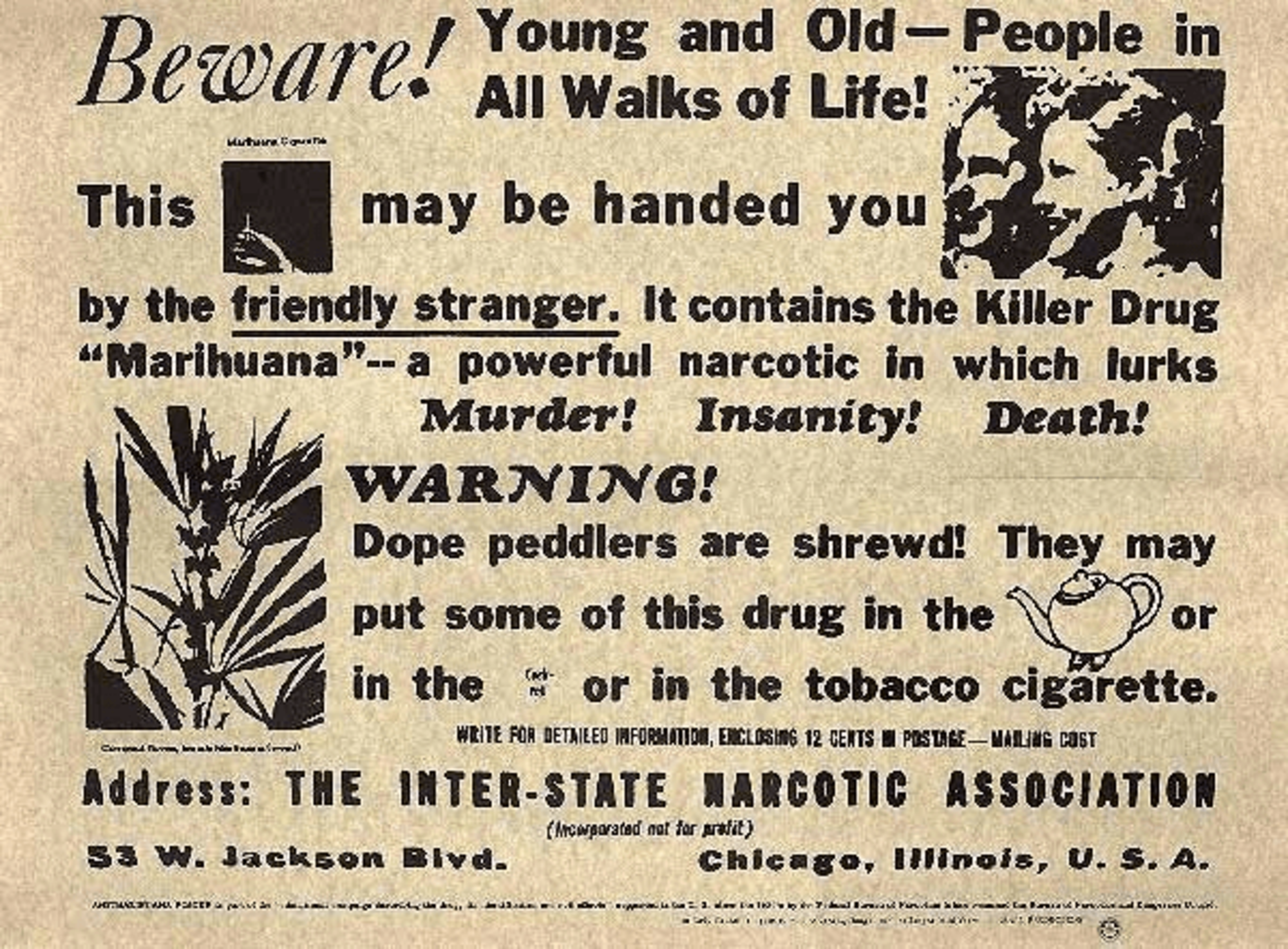
However, as earlier pointed out, like a shadow, marijuana has stubbornly stalked humans, with some embracing it while others do all they can to erase it from the face of the earth. Notably, those controverted to it, are influenced, not much because of its falsely exaggerated spectre of addiction and mental health misadventures, but due to social, cultural and economic dynamics. Ryan Stoa adds –
“Many societies throughout history have banned cannabis cultivation and use. What many of these crackdowns and prohibitions have in common is social and economic inequality, or a distrust of the unknown. When members of a minority or lower class embrace marijuana use, the ruling class moves to outlaw marijuana as a form of suppression and control. Marijuana is perceived to be a threat to the order of society, and stamping it out naturally begins with a prohibition on cultivation.”
The Chinese, Arab and Catholic Connections
Stoa goes on to expose that in ancient China, which may be home to the oldest known cannabis planters and where the earliest known written records about “psychoactive marijuana” come from, aversion was culturally inspired. Cannabis was prohibited because it was seen as an antisocial intoxicant, hence a threat to the growth and spread of Taoism, which emerged in China from around 600 BCE.
Amongst the Muslim Umma, the reception of marijuana has been a mixed bag. Whereas the Koran prohibits intoxicants, the wide spread use of hashish, a resin derivative of the cannabis plant, went hand in hand with the expansion of Islam. According to Stoa, “Early Arabic texts referred to marijuana as the “bush of understanding” and the “morsel of thought.” The mystical Sufi Muslims who comprised mostly of lower-class labourers, used hashish as a console “not only for personal enlightenment but to direct communication with Allah.” As early as the 13th century CE, they were overtly growing cannabis in Cairo Egypt.
This was eventually thwarted by the authorities through a punitive law (pulling of teeth!) and military expeditions. Driving the point home that the rejection of marijuana amongst ancient Islamic societies was also culturally and economically inspired, Stoa states that:
“[O]ne prominent theologian associated marijuana with the dreaded Mongol empire, and many upper – class Muslims pushed for prohibition, for the fear that marijuana use would disrupt the labour force.”
This same pattern of cultural subversion and suppression was a major influence in the stances taken by other major religions. In 1484, Pope Innocent VIII banned cannabis, which was grown in Europe by Pagans for “medicinal and spiritual applications”.
Whereas Christianity promised heaven in the afterlife, “[T]he pagans growing marijuana profoundly challenged this premise by promising spiritual enrichment in the present, with a plant grown here on earth.” Through a puff of marijuana, heavenly utopia was achievable here on earth! The Pope took this as a threat to his proselytising faith, and killed, exiled or imprisoned the pagans who cultivated this “unholy sacrament of the satanic Mass.”
It is this historicity and thinking that was imposed by colonial powers in conquered climes and peoples.
The Colonial Edicts Against Marijuana (enters Kenya)
Security and the steady supply of labour being a major objective, colonists viewed marijuana as an impediment. Wherever they landed, Spanish, Portuguese, British, French and Dutch conquerors issued edicts and took military action to stomp out the marijuana ‘joint’.
Closing in on the subject matter of this write-up – Kenya, that was colonised by the British, a similar approach was utilised. Informed by its experience in India, the then ‘jewel of the British Empire’ where marijuana was prominently (still is) used for religious and spiritual purposes, Britain’s approach in Kenya was informed by its lessons in India, which bequeathed the world the ubiquitous terms bhang, ganja and charas, indicating that by the time the Brits landed in India in the early 17th century, the marijuana pipe had long been burning and puffing.
From the 1760s onwards, shortly after the East India Company had set up shop in India, British administrators and the Indian ruling class pushed for a total ban of marijuana. The British Parliament, however had other plans. It saw marijuana as a revenue stream, and instead started taxing it from 1790. This tax and regulate approach was sustained, despite challenges from a formidable black market, under-par revenue collection capacity, and resilient prohibition movements that associated marijuana with opium. In 1894, these movements eventually stirred the British Parliament into action by, as reported by Stoa, “commissioning the most comprehensive government study of marijuana in history.”
Reporting in 1895 and after hearing from over a thousand witnesses from all over the world, the commission found that the eradication of agro-cannabis in India was impossible and that no evidence of its evil was found as alleged by the prohibitionists. It recommended a tax-and-license marijuana farming approach in the sub-continent.
Kenya’s Earliest Alliances with Marijuana
Kenya’s and India’s experiences with marijuana entangle in several ways. In Free the Weed: A Short History of Marijuana, Carrier and Klantschnig report that marijuana may have landed in the East African coastline around a millennium ago through Indian Ocean trade routes. The now domesticated and commonly used Indian term ‘bhang’ in Kenya testifies to this.
Secondly, inasmuch as Britain’s position to marijuana in India was somewhat tolerant, majorly due to revenue, formal regulation in both countries began with the British. Thirdly, and as discussed above, the association of marijuana with opium, a very hot political, cultural and trade potato at the turn of the 19th century, influenced both colonial and post colonial regulatory frameworks in both countries.
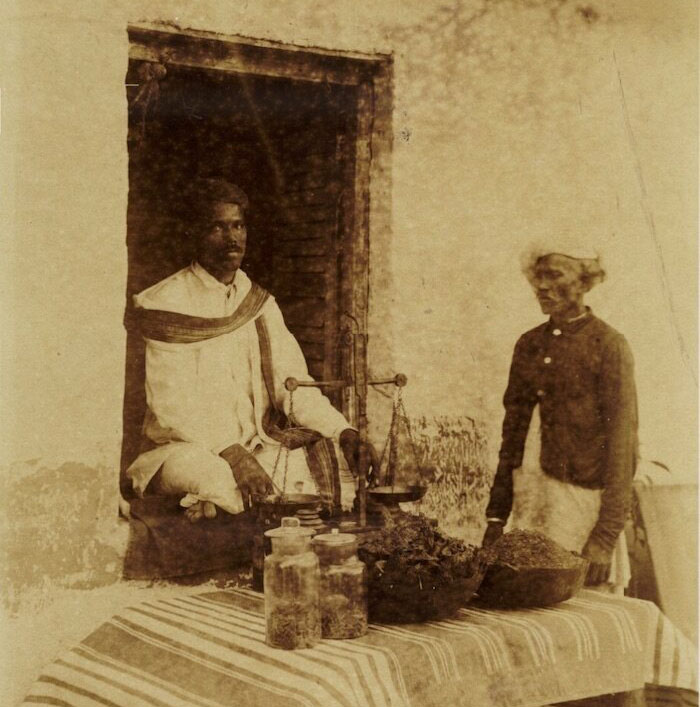
As Carrier and Klantschnig invitingly argue, the consumption of marijuana was probably regulated in traditional East African societies through extant social mores that controlled the consumption of other mind and mood altering substances like alcohol and khat. Such could only be used by adults or elders, and riding on the then gender dynamics, men only, in some communities.
Kenya Has Had The Weed For A long time
Instructively, no reports indicate pre-colonial restriction on its cultivation or occurrence (anecdotes from many parts of Kenya indicate that marijuana bushes, grew wildly and prevalently like ‘weeds’). The cultivation and consumption of marijuana, was therefore neither frowned upon nor universally accepted.
As Wanjiku Mwai elucidated in A New Frontier: A Case For Legalizing Marijuana in Kenya, communities living in present day Kenya used marijuana for various reasons including medicinal. According to her –
“Use has been widespread among indigenous communities, with peoples such as the Luo and Agikuyu using for various medicinal and even divine purposes. In Kenya, the plant was historically used to treat tetanus, hydrophobia, delirium tremens, infantile convulsions, neuralgia…and protracted labour during childbirth.”
These assertions are corroborated in a report dubbed The Africa Regional Hemp and Cannabis Report – 2019 Industry Outlook by New Frontier Data which reported that “Cannabis has been used in Africa for centuries for medical, ritualistic, and social purposes, and its use remains common.”
How Opium Gave Marijuana A Bad Name
In Kenya, then known as the East Africa Protectorate, statutory regulation of marijuana was entangled with that of opium. In 1902, the Opium Regulations Ordinance was passed. In consonance with the then prevailing international spectre surrounding opium, the edict aimed at regulating the business end of things – the production and sale of opium. This ordinance failed and the production, sale and consumption of opiates flourished.
Eleven years later, the Abuse of Opiate Ordinance was enacted. Unlike the earlier one, this law targeted consumption of ‘opiates’, which included bhang. As earlier pointed out, the control of marijuana was driven by socio-cultural and economic reasons more than altruistic ‘nanny state’ health and safety concerns.
As Carrier and Klanschnig indicate, in Kenya and other African colonial territories,
“drug ordinances did not usually grow out of colonial anxieties about these drugs’ threats to health or a paternalistic concern to “protect Africans” from foreign substances, as had been the case with distilled spirits…”
They emerged more from the fear that the consumption of opiates (marijuana), would negatively affect the productivity of African labour. Marijuana was like sand in the gears of the labour machine.
Kenya’s Post-Independence Hangover
The post–colonial Kenyan government’s stances about marijuana have aligned themselves to the international order which as described above, was rooted in cultural subversion, economic exploitation, and later specifically by opium. In the essay – A Brief History of Marijuana Prohibition in India: And why it should be reversed at the earliest, Deepak Mehta argues that “Cannabis is banned in India because it, like almost every nation, is subject to the Single Convention on Narcotic Drugs which was an offshoot of the US outlook on the use of any form of cannabis.”
This international convention was adopted in 1961 to consolidate earlier treaties controlling opium, coca, morphine, heroin, and cocaine. It also broadened scope by including cannabis and other drugs of similar repute. Mehta rather harshly links this universalisation of negative opinion on marijuana, through the convention on the then head of the America’s Federal Bureau of Narcotics Drugs, Harry J Anslinger. Anslinger is reputed to have entangled his racist, anti-immigrant, and business connections to crusade against marijuana in the USA and globally. On Anslinger, Wikipedia reports that “As a propagandist for the war on drugs, he focused on demonizing racial and immigrant groups.”
Then Came Kenya’s Anti-Marijauna Laws
Kenya ratified the convention in 1973. Thereafter, it ratified other international conventions and protocols, joined global and continental programmatic efforts for combatting marijuana and other drugs, and aligned its domestic regulatory framework, to the socio-culturally biased and economically subversive international one.
In 1994, Kenya’s Parliament enacted the Narcotics Drugs and Psychotropic Substances (Control) Act. This legislation defines cannabis as “the flowering or fruiting tops of the cannabis plant (excluding the seeds and leaves when not accompanied by tops) from which the resin has not been extracted, by whatever name they may be designated…”. It designates it as a narcotic drug whose possession attracts a prison term of ten years, if the court is satisfied that the possession was for personal consumption, and twenty for any other reason. Trafficking in cannabis attracts a fine of not less than one million shillings (c. 9,300 USD) and life imprisonment. Smoking (Bill Clinton would be in trouble!) or inhaling hands a person a maximum of ten years behind bars or a fine of two hundred and fifty thousand shillings (c. 2,300 USD). In addition to a prison term not exceeding twenty years, a ganja planter may be forced to forfeit the land where the plant was grown on to the government.
Rethinking Kenya’s Anti-Marijuana Laws
Despite these evidently tough measures, like in other parts of the world, the growing and consumption of marijuana has proceeded unhindered. In realisation of this, Parliament now intends to double down on the penalties.
As outlined in the Memorandum of objects and reasons for the Narcotics, Drugs and Psychotropic Substances (Control) (Amendment) Bill 2020, Kenya’s National Assembly seeks to “Enhance penalties related to the offences in possession and trafficking in narcotics and psychotropic substances…”
Whereas the bill intends to reduce the sentence that can be handed down to a person who “satisfies the court that the cannabis was intended solely for his own consumption…” from a maximum of ten years in prison to five, it introduces the option of a fine of not more than one hundred thousand shillings (c. 930 USD). The rationale for this is “to provide for punishments that best reflects (sic) the practice in court.”
It is therefore the sentencing practices other than social and economic factors that inspire the change. The bill seeks to enhance the sanctions for possession to a non-discretional thirty years prison term or a fine of not less than thirty million shillings (c. 279 000 USD) for possession of 1-100 grams of marijuana, and not less than fifty million (c. 463 000 USD) and fifty years in jail if one is found with more than 100 grams.
What Has Kenya Been Smoking?
The question begs, because Kenya seems to be flying against the wind of change currently blowing throughout the globe. Whereas countries, including the UK from which Kenya inherited its statutory stances (medical marijuana is now legal) have been softening their positions, Kenya is hardening its response.
Based on the World Health Organisation’s (WHO) recommendations made on 24 January 2019, on 1 December 2020, the United Nation’s Commission for Narcotic Drugs voted to remove cannabis from Schedule IV of the Single Convention, paving way for member states to domestically follow suit and avail access to marijuana for medical uses and research.
Globally, eleven countries, with varied qualifications including age, location of use, and metrics, have decriminalised the use of marijuana for recreational uses. In the United States, seventeen states have followed suit, with thirty-six states, four permanently inhabited U.S. territories, and the District of Colombia have legalised the use of cannabis for medical marijuana. Fourty two countries have legalised medical marijuana.
Marijuana’s Winds of Change Blow Across Africa
In Africa, the reformation wind seems to be strongly blowing southwardly with Malawi, Zimbabwe, Lesotho, South Africa blazing the way in changing their laws on marijuana. Whereas the rest have to accommodate marijuana for medical, industrial and export purposes, in 2018, through the long fight put up by the Rastafari community in South Africa and Rastafari lawyer Gareth Prince, the South African constitutional court sent the country on a high when it ruled that
“The right to privacy is not confined to a home or private dwelling. It will not be a criminal offence for an adult person to use or be in possession of cannabis in private space.”
Away from the south, in January 2020, the Ugandan Ministry of Health announced that it had entered into deals to export marijuana to Germany and Canada. In October 2020, the Rwandan government announced that it will commence issuing licences for growing cannabis for medical use. However, this will be for the export market only. It therefore remains to be seen whether health and medical facilities and practitioners within Uganda and Rwanda shall have access to the same. All in all, these African economies whose need for the extra dollar needs no gainsaying are looking to tap into the medical marijuana revenues estimates to range between 150 – 200 billion USD.
Kenya is Still Snoozing, and Therefore Losing
Despite these international and regional shifts, the Kenyan government remains ‘akimbo’.
The head of Kenya’s National Authority for the Campaign Against Alcohol and Drug Abuse (NACADA) signalled Kenya’s intentions to sustain its stance when he confirmed that Kenya was averse to the WHO’s and the UN’s evolution. Kenya argued for the “retention of the cannabis plant and cannabis resin in both Schedule 1 and 4 of the 1961 Convention.”
With this outlook, the Kenyan government seems to be falling within the Einsteinian definition of idiocy – “doing the same thing over and over again, but expecting different results.” History has taught the world that the energy expended towards the uprooting of the cannabis plant and its consumption (for whatever reasons), all went to waste, and the same reality applies in Kenya.
Tough laws and anti-marijuana programmes notwithstanding, Kenyans are still growing, trading and consuming marijuana for religious/spiritual and/or recreational purposes. That is why inasmuch as NACADA, sister government agencies and religious formations (major ones) continue to ignore the scientific evidence that has debunked the racially, culturally and economically biased misinformation that has kept marijuana in damnation, many Kenyans have not.
New Frontier Data reports that Kenya’s cannabis market is Africa’s seventh largest, with a value of c. 730 million USD as of 2019, with an estimated 3.3 million regular users. Several efforts that reflect the reality that Kenya should rehabilitate its laws so that its citizens can benefit from the evident medical and economic benefits have been made.
We Should’ve Listened to Ken Okoth and Gwada Ogot
In Parliament, pronouncement by several MPs in favour of the legalisation of marijuana for medical use have been sounded. Most notable was that of the late Kibra MP Ken Okoth, who introduced in the National Assembly the Marijuana Control Bill 2018, aimed at decriminalising marijuana for medical use.
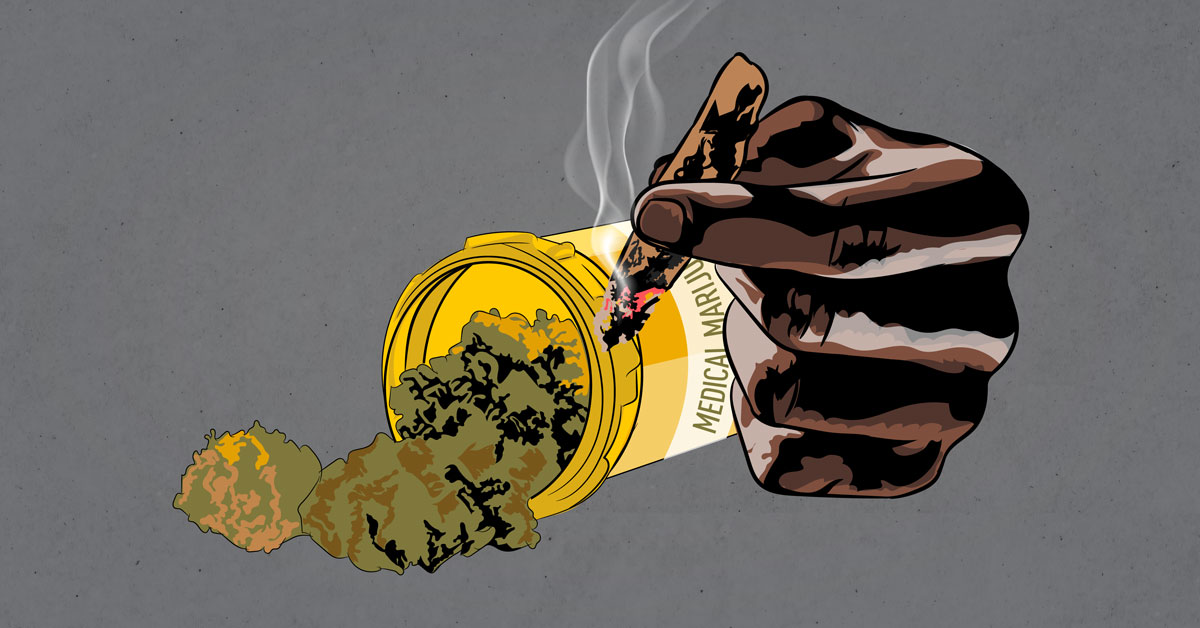
In the accompanying letter to the Speaker, Okoth stated that “The proposed Bill seeks to ensure there is regulation for growth and safe use of marijuana and hemp including the registration of growers, producers, manufacturers, and users with special focus on the protection of children from illicit use just as we do with tobacco and alcohol.”
Unfortunately, Okoth passed away before further action had been taken on his motion.
Okoth’s efforts complimented those of Gwada Ogot who in 2018 unsuccessfully petitioned Parliament to decriminalise marijuana for medical and economic reasons.
Rastafarians To The Rescue
The latest of these efforts has been made by the Rastafari Society of Kenya, which on 17 May 2021 filed a petition in the High Court of Kenya seeking to have certain sections of the Kenyan narcotics drugs law declared unconstitutional and struck out because “the impugned section clearly show differential treatment on the basis of religion and privacy perpetuates culture, stigma and discrimination…”
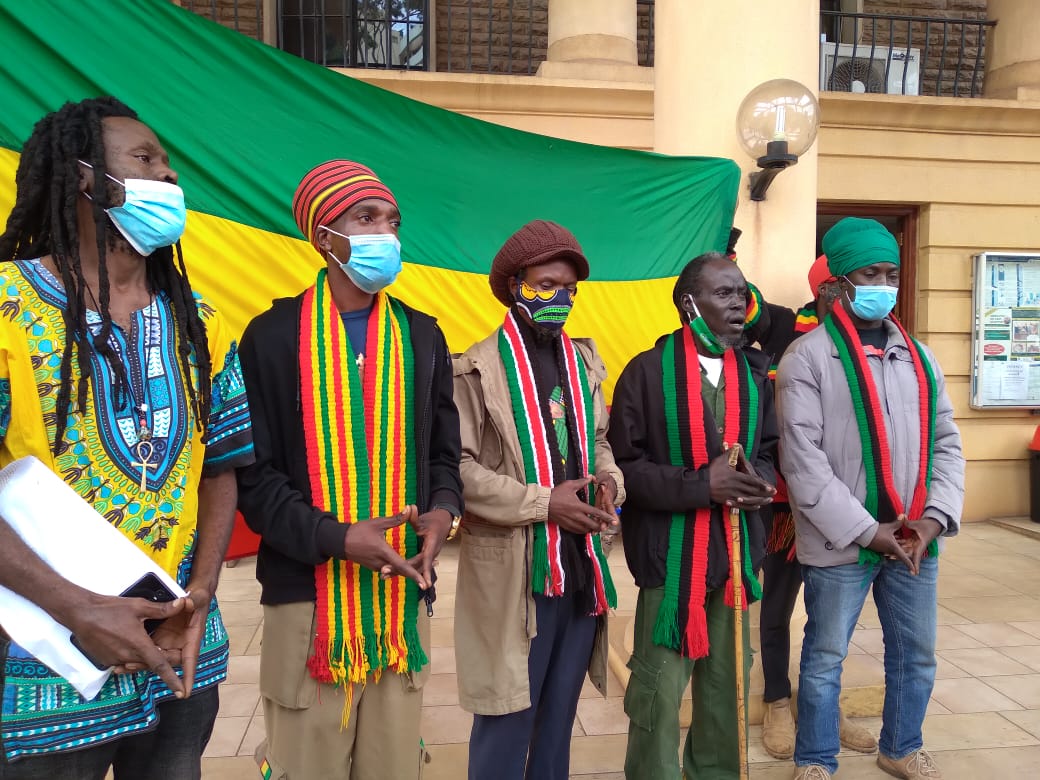
Buoyed by Kenya’s transformative and human rights top-heavy 2010 Constitution – and a 2019 decision by the same court that recognised the Rastafarian Society as a religion – the petitioners argue that because Kenya’s constitution guarantees the rights of freedom of worship, privacy, and dignity amongst others, and that because marijuana is of spiritual utility to Rastas (consumed through smoking, drinking, burning as incense, for medical and nutritional purposes), they should not be criminalised for professing their faith.
Kenyans are waiting to see which way the smoke will blow this time around.
Kenya Must Break Free of Its Anti-Marijuana Chains
It has been this article’s thesis that Kenya’s official position on marijuana is unrealistic, anachronistic, imprudent and vestigial to colonial instincts. As has been shown, marijuana has been farmed and used by humans since time immemorial. Indeed, it is the testimony of some that it has co-evolved with humans, meaning marijuana’s bad rap was intentionally misinformed and biased.
There is no doubt that in olden times, cultural and religious supremacy wars which oftentimes manifested through class stratification played a big role in determining whether cannabis was kosher or not. These instincts endured to the times of European conquest and domination of the world and its industrialisation when cannabis was seen as an obstacle to the mobilisation of labour (colonial, indentured, forced, slave).
In the middle to late 19th century, opium was a key economic and trade commodity. The regulation of its production, trade and use played a key role in the modern regulation of marijuana which was eventually lumped with ‘opiates’. It is with this historical and colonial train that marijuana regulation arrived in Africa and Kenya.
However, the world has since awoken and smelt the ganja smoke, and realised the historical remiss of its ways because information now reveals that cannabis is more beneficial – medically, economically, socially, and culturally, than as earlier portrayed as being harmful.
Viewed from a Libertarian perspective, and with the available information that counters the misinformation and hyperbole about the psychological, psychic and addictive effects of marijuana (alcohol, tobacco, and shopping are also very addictive but legal!), it raises the question why the reported 3.3 million Kenyans who regularly consume marijuana – regardless of the excessively punitive legal regime – should not be left alone to exercise their right to choice?
Ultimately, the question begs, should we pass the ‘Dutchie’?
Bobby Mkangi is a Kenyan lawyer and was a member of the Committee of Experts (CoE) on Constitutional Review.
